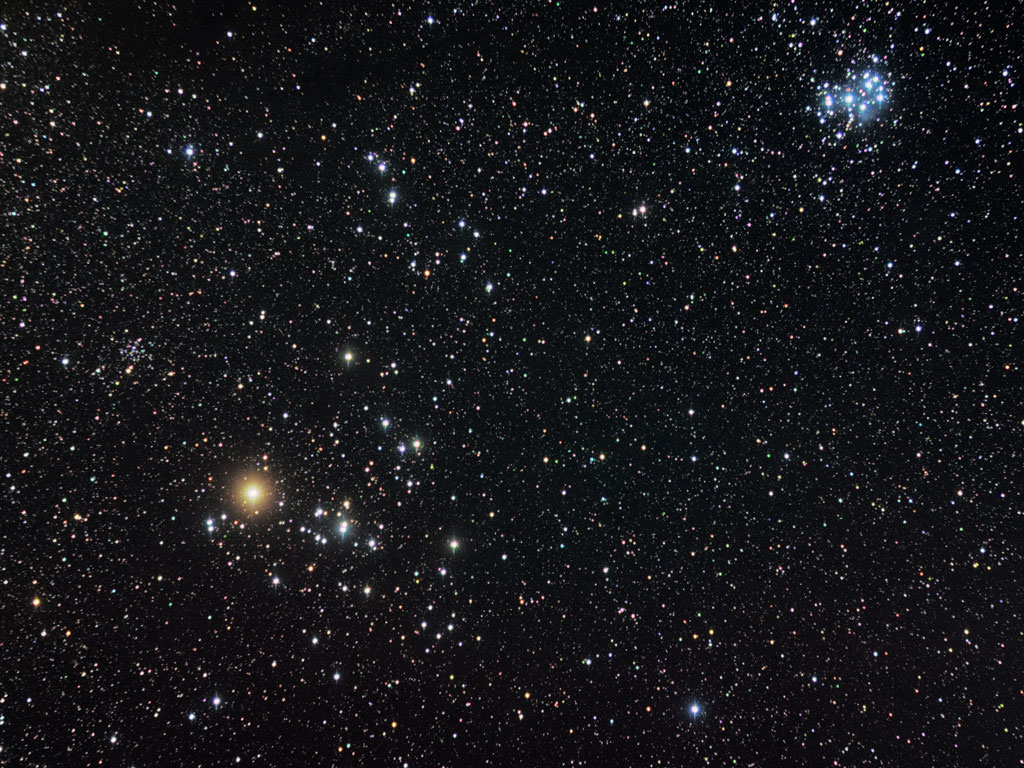Physicist: Of the four forces: gravity, electromagnetism, nuclear-strong, and nuclear-weak, only the first two, gravity and EM, affect things over distances (at least, over distances larger than an atomic nucleus). So, if the planets and stars have any direct influence on us it should be by way of one or both of those forces.
The Moon’s gravity famously causes the tides, but the Moon’s electric field is effectively zero (but very interestingly, not exactly zero), and its magnetic field is random, scattered, and nearly non-existent.
The effect of gravity is much, much stronger than the effect of magnetic fields, and even the effect of gravity between planets is tiny. The bulk of those tiny forces is off-set by the fact that the Earth is free to move and fall through space (during free-fall is the only time you don’t feel gravity). This leaves only the much weaker secondary “tidal effects“, so called because they’re responsible for the tides which, although seemingly impressive, require very little force (specifically, the difference in the strength of the Earth’s gravity over the half-dozen feet of the tides).
The Moon’s gravity causes tides, but effectively nothing else. The Sun’s gravity has about 40% of the Moon’s influence and Jupiter, which completely dwarfs the effects of all of the other planets combined, has about 1 two-hundred-thousandth of the Moon’s tidal effect.
More than that, the gravity and electromagnetic influence of planets isn’t terribly surgical. Either will just pull on you in a very uniform way. They don’t grab a few cells at a time and re-write you love life or change your mood. Probably. Point is, our understanding of the known forces of the universe preclude the idea of the planets and stars having any direct influence on people.
Now to be fair, not being able to fit something into the current model doesn’t immediately exclude it from the realm of possibility. For example, way back in the day the science fluid dynamics was really good at explaining how things like air and water move, but also “proved” that nothing should be able to fly. Another beautiful example was a conundrum faced by geologists around 1900. They had buckets of evidence that the Earth was at least hundreds of millions of years old (the ones who turned out to be right thought that the Earth was substantially older), and yet a back-of-the-envelope calculation showed that during that time the interior of the Earth should have cooled so much that volcanoes and other geothermal nonsense should be absolutely impossible.
But of course a quick look around shows a world full of birds and volcanoes. So if there’s something around (birds and volcanoes), it really makes no difference what the prevailing scientific theory says one way or the other. Because reality wins. It’s even written into the science charter, line one: “reality wins”.
By the way, the “flying issue” was later solved by taking into account rotational flows and viscosity, and the “warm Earth problem” is resolved by taking into account radioactive decay (which hadn’t been discovered yet).
So the better question isn’t “can so-called ‘science’ explain astrological effects?” but instead “are there astrological effects?”. There has been a lot of research into astrological phenomena, but so far all of the results have been negative or unrepeatable (science talk for “this isn’t a thing”). Since the 18th or 19th century the scientific community has pretty much stopped looking, but they were at it for a very long time. There aren’t many scientific papers that seriously investigate this sort of thing, partly because the results are well-known, and partly because the experiments involved are easy enough that they tend to show up in middle-school science fairs relatively often (this is also why there are no articles in Nature about baking soda and vinegar volcanoes).
For example, just take all of the astrological predictions out of a newspaper (pardon: website) and read them in a random order to someone else (this is called a “blind experiment”) and see which one is closest to being accurate. You’ll find that the “correct one” is selected about once out of every 12 trials.
Long story short; whatever affect other planets and stars may have on us individually is completely drowned out by local “noise” (like the gravity and EM field of a passing truck), and worse there doesn’t seem to be an effect that needs explaining.








59 Responses to Q: How much of a direct effect do planets and stars have on us? Is astrology reasonable or plausable?